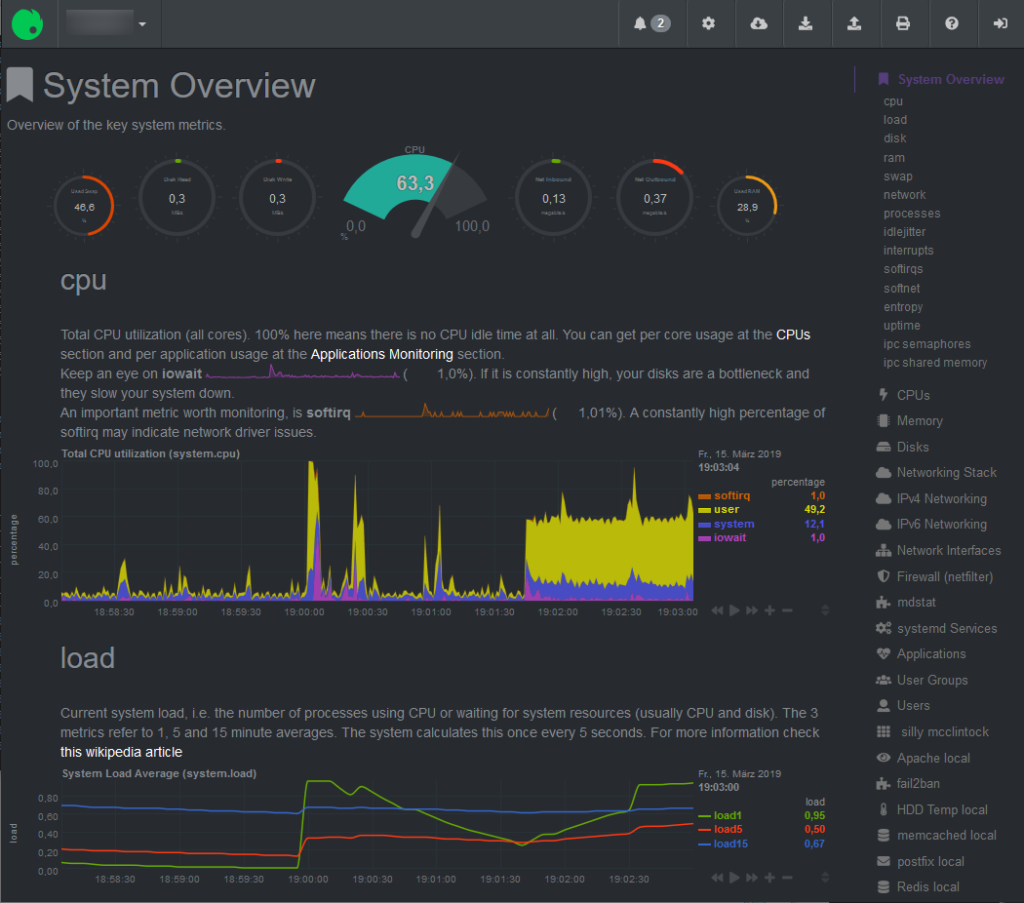Monitoring mit Netdata
Netdata ist eine verteilte Echtzeit-, Leistungs- und Zustandsüberwachung für Systeme und Anwendungen. Es ist ein hochoptimierter Überwachungsagent, den Sie auf allen Ihren Systemen und Containern installieren.
Netdata bietet mit Hilfe von hochgradig interaktiven Web-Dashboards in Echtzeit einen beispiellosen Einblick in alles, was auf den von ihm betriebenen Systemen passiert (einschließlich Webserver, Datenbanken, Anwendungen). Es kann autonom, ohne Drittanbieter-Komponenten betrieben werden oder in bestehende Monitoring-Toolketten (Prometheus, Graphite, OpenTSDB, Kafka, Grafana, etc.) integriert werden.
Netdata ist schnell und effizient und so konzipiert, dass es dauerhaft auf allen Systemen (physische und virtuelle Server, Container, IoT-Geräte) läuft, ohne deren Kernfunktion zu beeinträchtigen.
Netdata ist eine kostenlose Open-Source-Software und läuft derzeit unter Linux, FreeBSD und MacOS.

Installation
Der Installer installiert Netdata auf Port 19999 TCP
bash <(curl -Ss https://my-netdata.io/kickstart.sh)All Done! - Now proceed to the next step.
OK
[/tmp/netdata-kickstart-ymZIdg]# curl -sSL --connect-timeout 10 --retry 3 https://storage.googleapis.com/netdata-nightlies/sha256sums.txt
OK
[/tmp/netdata-kickstart-ymZIdg]# curl -sSL --connect-timeout 10 --retry 3 https://storage.googleapis.com/netdata-nightlies/netdata-latest.tar.gz
OK
[/tmp/netdata-kickstart-ymZIdg]# tar -xf netdata-latest.tar.gz
OK
--- Installing netdata... ---
[/tmp/netdata-kickstart-ymZIdg/netdata-v1.19.0-336-gc2fcb04b]# ./netdata-installer.sh --auto-update
^
|.-. .-. .-. .-. . netdata
| '-' '-' '-' '-' real-time performance monitoring, done right!
+----+-----+-----+-----+-----+-----+-----+-----+-----+-----+-----+-----+--->
You are about to build and install netdata to your system.
It will be installed at these locations:
- the daemon at /usr/sbin/netdata
- config files in /etc/netdata
- web files in /usr/share/netdata
- plugins in /usr/libexec/netdata
- cache files in /var/cache/netdata
- db files in /var/lib/netdata
- log files in /var/log/netdata
- pid file at /var/run/netdata.pid
- logrotate file at /etc/logrotate.d/netdata
This installer allows you to change the installation path.
Press Control-C and run the same command with --help for help.
NOTE:
Anonymous usage stats will be collected and sent to Google Analytics.
To opt-out, pass --disable-telemetry option to the installer.
Press ENTER to build and install netdata to your system >netdata by default listens on all IPs on port 19999,
so you can access it with:
http://this.machine.ip:19999/
To stop netdata run:
systemctl stop netdata
To start netdata run:
systemctl start netdata
Uninstall script copied to: /usr/libexec/netdata/netdata-uninstaller.sh
--- Installing (but not enabling) the netdata updater tool ---
Update script is located at /usr/libexec/netdata/netdata-updater.sh
--- Check if we must enable/disable the netdata updater tool ---
Adding to cron
Auto-updating has been enabled. Updater script linked to: /etc/cron.daily/netdata-update
netdata-updater.sh works from cron. It will trigger an email from cron
only if it fails (it should not print anything when it can update netdata).
--- Wrap up environment set up ---
Preparing .environment file
[/tmp/netdata-kickstart-ymZIdg/netdata-v1.19.0-336-gc2fcb04b]# chmod 0644 /etc/netdata/.environment
OK
Setting netdata.tarball.checksum to 'new_installation'
--- We are done! ---
^
|.-. .-. .-. .-. .-. . netdata .-. .-
| '-' '-' '-' '-' '-' is installed and running now! -' '-'
+----+-----+-----+-----+-----+-----+-----+-----+-----+-----+-----+-----+--->
enjoy real-time performance and health monitoring...
OKnetstat -putan|grep netdatatcp 0 0 127.0.0.1:8125 0.0.0.0:* LISTEN 4591/netdata
tcp 0 0 0.0.0.0:19999 0.0.0.0:* LISTEN 4591/netdata
tcp6 0 0 ::1:8125 :::* LISTEN 4591/netdata
tcp6 0 0 :::19999 :::* LISTEN 4591/netdata
udp 0 0 127.0.0.1:8125 0.0.0.0:* 4591/netdata
udp6 0 0 ::1:8125 :::* 4591/netdataApache
<Location /netdata>
Require all granted
</Location>
RewriteEngine On
RewriteRule ^/netdata$ /netdata/ [R,L]
RewriteRule ^/netdata/(.*) http://127.0.0.1:19999/$1 [P]